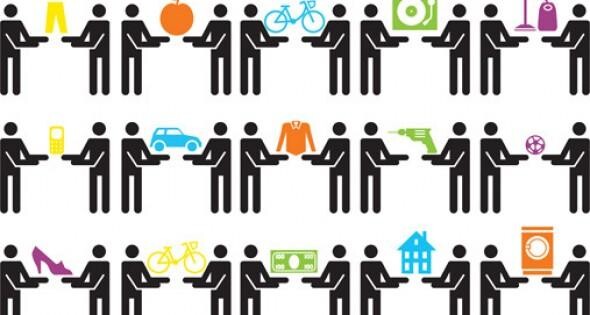hankyoreh
Links to other country sites 다른 나라 사이트 링크
[Sharing economy] The growth of the sharing economy in South Korea

By Kim Kwang-soo, Busan correspondent and Jung Tae-woo, staff reporter
Not only tangible goods like vacant rooms, parking lots, cars, clothes, and books, but also intangible goods like knowledge, talent and experience can increase in value when they are shared. For example, if the owner of a house has some free rooms to rent, others can use them and make better use of the space. Sharing economy was selected by Time Magazine as one of 10 ideas that will change the world. The Hankyoreh will go deep into what is happening to sharing economy in Korea, and provide a vision for Korean sharing economy.Sharing economy: new consumption trend spreading out quickly
Sharing Economy has started to settle in Korea. It just needs more time and cooperative social effort to become established.
Last year, Seoul declared itself as the City of Sharing. It then selected and implemented sharing economy action plans from 20 sectors such as parking lots, vacant rooms, books, cars, and clothes. Seoul City also enacted a bill for the first time in December, which aims to provide financial and administrative support to those companies that volunteer to be pioneers in laying the groundwork for the sharing economy. In April it designated 24 organizations and companies, 12 of which will be provided with 200 million won if they show progressive achievements with sharing economy. On June 26 an online sharing hub that will gather information related to the sharing economy.
Cho In-dong, Seoul City Innovation Planning Officer, said, “People are at the center of the sharing economy. It is more than just an ordinary campaign to save and share resources; it connects people in order to use the resources together and satisfy each others’, while creating new values in the mean process. By doing this, we can create new jobs as well as niche markets. These will be foundation for development of the sharing economy.”
Busan has also noticed the budding of the sharing economy. Busan Development Institute (BDI) invited experts to a public discussion on June 2 where they suggested 21 business sectors where Busan can grow and contribute to the increase in local employment and household income. On May 27 it also formed a regular meeting, named as Sharing Economy, where future entrepreneurs, experts, and citizens can communicate and exchange their thoughts for sharing economy.
Sharing economy-type companies are spreading around quickly regardless of region due to its business model based on social media such as Facebook or Twitter. Unlike the usual rental car services where you can rent a car by day, you can rent cars by the hour, or half hour. Socar is one of the short-time car rental companies that started on Jeju Island, but now penetrated a new market in Seoul. Another type of companies that utilize the concept of sharing economy is kmong, which shares the talents among different people. Its headquarter is in Jinju, South Gyeongsang Province.
The sharing economy is evolving. Now there is even a platform service that connects people with common interests to have meals together.
Lee Jae-heung, Senior Researcher at the Hope Making Institution Social Economy Center said, “Civic groups and local government in San Francisco have established ‘Sharing Economy Working Group’ where lawyers previewed the legal conditions for implementing sharing economy business models and related policies. Unlike in San Francisco, Airbnb was ruled illegal in New York. The sharing economy can best succeed through private and public joint administration, when central and local governments, and companies and civic organizations cooperate.”
Translated by Dong-ju Lee, Hankyoreh English Intern
Please direct questions or comments to [english@hani.co.kr]
Editorial・opinion
![[Editorial] Does Yoon think the Korean public is wrong? [Editorial] Does Yoon think the Korean public is wrong?](https://flexible.img.hani.co.kr/flexible/normal/500/300/imgdb/original/2024/0417/8517133419684774.jpg) [Editorial] Does Yoon think the Korean public is wrong?
[Editorial] Does Yoon think the Korean public is wrong?![[Editorial] As it bolsters its alliance with US, Japan must be accountable for past [Editorial] As it bolsters its alliance with US, Japan must be accountable for past](https://flexible.img.hani.co.kr/flexible/normal/500/300/imgdb/original/2024/0417/6817133413968321.jpg) [Editorial] As it bolsters its alliance with US, Japan must be accountable for past
[Editorial] As it bolsters its alliance with US, Japan must be accountable for past- [Guest essay] Amending the Constitution is Yoon’s key to leaving office in public’s good graces
- [Editorial] 10 years on, lessons of Sewol tragedy must never be forgotten
- [Column] A death blow to Korea’s prosecutor politics
- [Correspondent’s column] The US and the end of Japanese pacifism
- [Guest essay] How Korea turned its trainee doctors into monsters
- [Guest essay] As someone who helped forge Seoul-Moscow ties, their status today troubles me
- [Editorial] Koreans sent a loud and clear message to Yoon
- [Column] In Korea’s midterm elections, it’s time for accountability
Most viewed articles
- 1[Column] The clock is ticking for Korea’s first lady
- 2Samsung barricades office as unionized workers strike for better conditions
- 3[Editorial] When the choice is kids or career, Korea will never overcome birth rate woes
- 4[News analysis] After elections, prosecutorial reform will likely make legislative agenda
- 5S. Korea, Japan reaffirm commitment to strengthening trilateral ties with US
- 6Why Israel isn’t hitting Iran with immediate retaliation
- 7[Guest essay] How Korea turned its trainee doctors into monsters
- 8Japan officially says compensation of Korean forced laborers isn’t its responsibility
- 9[Editorial] Does Yoon think the Korean public is wrong?
- 10[Editorial] 10 years on, lessons of Sewol tragedy must never be forgotten